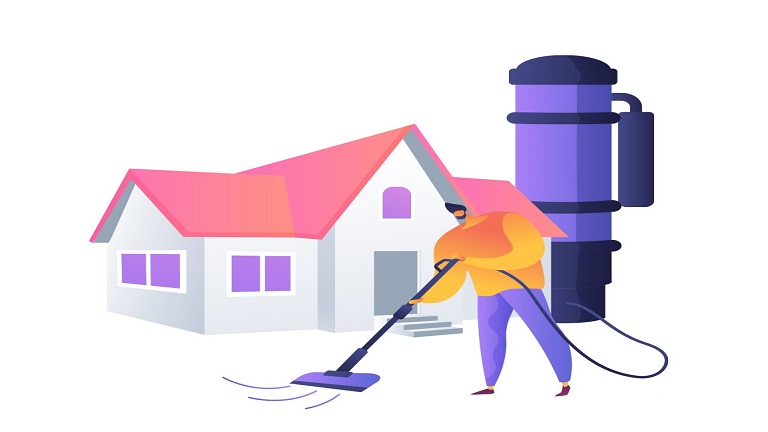
Central vacuum systems have many advantages. From not having to carry big bulky machines around to clean, to removing dust and odours the residential central vacuum system is an integral part of house maintenance activities. The heart of this central vacuum system is the power unit whose motor runs a vacuum pump that provides the necessary suction and a holistic deep cleaning experience.
The central vacuum system has hoses that are durable and drain directly into the collection area. Though these are typically very robust and are semi-permanent fixtures, much like your electrical or plumbing systems. It is rare for central vacuum systems to be replaced, However, they do need regular maintenance and check-ups. This will ensure your system does not break down unexpectedly. Imagine that happening in an industrial setting where every minute of production comes with a cost.
Vacuum pumps in central vacuum cleaners:
Vacuum pumps are used everywhere across industries from industries to healthcare, homes to laboratories. In the most simple terms, vacuum pumps are special devices built to remove a certain area of air or gas. Most of the time this is in order to seal, preserve or clean the area.
They are widely used in industries like the food and beverage industry, where you come across vacuum sealing for packing food, the electronics industry where semiconductors and small surfaces are plasma cleaned, plastics and refineries for transport etc.
Vacuum pump failure :
Like any other piece of machinery, central vacuum systems need maintenance and are subject to wear and tear. A Commercial central vacuum system has more than one operator and is heavy-duty machinery. Depending on where and how they are used, you may have to look at signs that indicate vacuum pump failure. These issues need to be addressed at the earliest to avoid huge costs.
Just like an abnormal sound or low performance in an automobile indicates the compromised capability of a car vacuum pump, there are indicators for central vacuum system pumps too.
In this post, we will look at a few signs that show your vacuum pump needs attention.
Maintenance and upkeep:
Be assured that 99% of the time, there are tell-tale signs of a vacuum pump failure. When it occurs suddenly, it only means we have ignored these signs.
That said, a vacuum pump is a smaller part of the bigger central vacuum system, making it difficult for us to place a finger on what a perfectly functioning vacuum pump is like.
Annual maintenance schedules, regular cleaning of build-ups and servicing of components most subject to wear and tear are necessary to keep the system running at full throttle.
A few indicators of a malfunctioning vacuum pump are:
Noise and rattling movements:
If the vacuum pump of a central vacuum system makes rattling or loud asynchronous noises it may need immediate attention. Wear and tear due to prolonged usage of the system may result in parts like valves, diaphragms and seals wearing, causing air damage. If not attended to immediately the entire pump may require replacement.
Slow-starting pumps:
In a few cases, the vacuum pumps of the residential central vacuum system may start very slowly. This may be due to a blockage at the inlet or the outlet, a weakened motor capacity, or a damaged power unit. Check for the electrical components first, and if everything is in order see if the system inlets and outlets have something blocking it.
Slow or compromised efficiency:
When dirt, dust and other particulate matter enter the vacuum chamber and cake the pump, it may hamper the pump’s performance. You will notice frequent shutdowns of the vacuum pump or the pump in itself may become slow and inefficient. This results in a reduced capacity of the vacuum pump, and if left unattended, contaminant buildup may result in vacuum pump failure. Cleaning the vacuum pump at regular intervals will help avoid this situation.
Overheating and regular shutdowns:
When vacuum pumps get heated due to poor ventilation, contaminant build-up or faulty motors, the pump may fail due to overheating. Most of the time fixing the underlying motor issue or incompatible attachments and motor components will fix the issue.
Pump Shut down:
You might also be faced with a situation where the pump won’t turn on. This might be an electrical issue, where the motor fuses are broken or need replacement. Also, check for voltage fluctuations – a sudden surge in voltage could also result in burnout of the wires and may end up damaging your entire equipment.
To summarise:
A periodic maintenance check is irreplaceable. Do not compromise on giving your central vacuum system the annual medical check-up it needs.
Most of the time you can prevent bigger issues with small things kept in order. Check for common troubleshooting issues as listed above to understand common reasons why vacuum pumps misbehave.
Drainvac is a world leader in central vacuum systems. With patented technology, we offer customised solutions for all residential, industrial and commercial vacuum needs.


